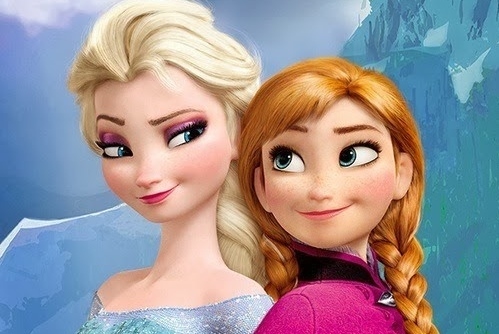Over the course of this year, I've seen a half dozen movies with my daughter. From the bad -- yes, Free Birds, I mean you -- to the somewhat misbegotten (did anyone involved in Despicable Me II read it before it was assembled?), I've sat by her side as she ate popcorn and absorbed many familiar and sometimes dispiriting messages. Occasionally, some vivid bursts of creativity, as in the forest graphics of Epic, have stood out, and sometimes it's been enough to have plenty to laugh at (Cloudy With a Chance of Meatballs II). But not until Frozen had I seen a movie that said anything at all fresh and relevant, or that I would recommend simply for its values.
Frozen is a very loose riff on the story of the Snow Queen, this timed re-imagined as the tale of two sisters: one misunderstood, the other ill-equipped for understanding. Elsa (Idina Menzel) is cold, literally, and knows that her inability to control her power to create ice can hurt others, so she shuts herself off from her sister and their entire kingdom. Anna (Kristen Bell) is warm, a gregarious Disney princess of the current spunk-and-sass variety, and she doesn't have a handle on why Elsa shuts her out. When Elsa's secret is revealed, her response imperils the kingdom, setting off a quest that involves one sister, several teams of soldiers, a snowman (Josh Gad), a reindeer, and the cinematic equivalent of a Hemsworth (Jonathan Groff).
During the first third of the film, I was groaning under the weight of the by-the-book Disney tropes: dead parents, a ball with a prince and love at first sight, forces conspiring to threaten the princess, a down-to-earth hunky friend who could become something more, and requisite funny sidekicks. I was quietly hoping that these elements were being established just to be undone later -- and, happily, that was exactly what was taking place. [Warning: Spoilers aplenty ahead. Stop reading if you mind.]
Take for instance, the prince and the hunky hero. After the movie lets men, women, and trolls set up the notion of true love as being the key to saving the heroine, it is neither the prince (who is, in fact, the villain) nor the hunky hero who save anything. The act of true love is not "true love's kiss" as the trope would suggest, but Anna putting herself in harm's way to protect Elsa, despite all the ways she has been wounded by her sister. Like Beauty & the Beast refracted through the mirror of family, Anna isn't saved by anyone: she saves herself from death, even after appearing to lose that battle, by saving Elsa. In turn, when Elsa sister understands the value of what they have, she saves everyone else.
Despite the presence of a likable romantic lead, this is a new kind of fairytale ending: the true love here is sisterhood and the day is saved not but trusting a new relationship but by repairing the ones you already have. It's a pretty wonderful message for families, in part because it allows both sisters to be valuable in their own way, despite also being hurtful to each other at times. And it is in the way the film allows for Elsa's worth that it sets up its second great message.
Elsa is shown as aware of how hard it is to control her problem behaviors, so she alternately withdraws from others to protect them and gives into just letting the trouble fly, because to do so feels freeing. There are times when her behavior seems selfish and other moments it reflects pure fear and confusion. Because the difference between sisters is not portrayed as good versus evil, there is no need for the film to vanquish Elsa or to fully change her.
Instead, Frozen both allows her to keep the elements of her personality that are challenging and learn to channel them, making something beautiful when she does. While the out-of-control version of her gift leads to destruction, the film nonetheless ends with her capitalizing on the same attribute to enchant her subjects and sister alike.
For children with behavioral challenges or temperaments ill-suited to conformity and social ease, Elsa is a heroine that is truly relatable. She's not allegorical, not just a monster that isn't scary or a penguin that can't dance, but a human who screws up, wrestles with the results, and still finds her way to function in a world where she feels atypical. To see her story arc, failing her sister without meaning to and still having a role in the family at the end, could be incredibly uplifting and hopeful for any child whose behavior puts them outside their family's comfort zones (or their own).
With a difficult daughter nonetheless embraced by her community at the end and a pair of sisters bonding despite their differences, Frozen offers family moviegoers something to celebrate this holiday season.
